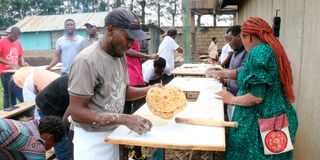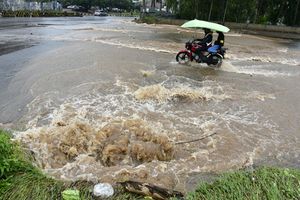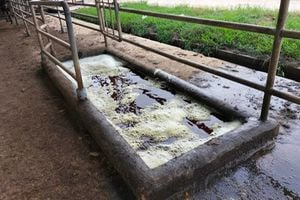
John Mbugua, a survivor of the Mai Mahiu tragedy is comforted by a counsellor and other women at PBB prayer centre on May 6, 2024. Death toll now stands at 59.
A week after the Mai Mahiu flash floods that killed 60 people, television cameras have left and there are no more dignitaries arriving in helicopters.
There are no longer convoys of vehicles racing through Kamuchira, Jerusalem, Githioro, Georges and Ruiru villages that bore the brunt of the floods.
The attention of the country has turned to other flood-hit areas and things, leaving the victims and other residents to grapple with the aftermath in solitude.
But for the victims of the tragedy, it will be long before anything feels normal.
The Nation on Monday visited the camps where families are living and the harsh reality of rebuilding lives and homes is slowly setting in.
We found John Macharia sitting quietly as he keenly followed a counselling session. His hands and feet bear scars of that horrific Monday morning. Beside him is a pair of crutches, and he has a bandage on his head.
Macharia is yet to come to terms with the loss of his wife and two children in the floods. For the past six days, he has been receiving treatment at the Naivasha sub-County hospital.
He was discharged on Sunday morning to join other victims at Ngeya Secondary School where they are being hosted.
However, on Sunday afternoon, he was relocated to the Prayer Build Boundaries Prayer Centre together with other 65 families.
Recalling the incident, Mr Macharia said that they were asleep when the tragedy struck, leaving each to fight for their lives.
He said that his wife was the first one to wake up after hearing a loud bang, he followed her only to be swept away by water.
Mr Macharia was rescued by villagers and a good Samaritan offered to rush him to the hospital. He had sustained deep cuts and bruises all over his body.
“I do not know how I managed to get out of the house, I was floating in the water. I just told God to take me and spare my family but they died and I survived. I fought for my life as I called for help, I was naked and shivering but I held onto a tree branch. I am alive but I lost my wife and two children,” he says
At their new “home”, they are trying to cope with the loss of their loved ones, properties and livestock.
Well-wishers are still streaming in with donations while counsellors are conducting individual and group sessions to help them deal with the grief.

Volunteers prepare food for displaced families of the Mai Mahiu tragedy at PBB prayer centre on May 6, 2024. Death toll now stands at 59.
Amidst the destruction, families mourn loved ones lost to the merciless floodwaters, while others search desperately for any remnants of their former existence. The once vibrant neighbourhoods now stand as solemn memorials to the lives forever altered by the tragedy.
Meanwhile, a joint memorial mass for the victims is set to be held on Thursday.
President William Ruto, his deputy Rigathi Gachagua and other top government officials are expected to attend the memorial service in Mai Mahiu.
As burial plans begin, some families are still optimistic that they will find their loved ones alive, days after the tragedy.
Some said they had visited various hospitals and mortuaries to look for missing kin without success.
In Molo, Nakuru County, over 100 households have been affected and others displaced by flood waters in Kaloleni estate.
When the Nation arrived at the scene, tenants were carrying their household items and personal belongings and evacuating livestock to safer grounds.
While distributing food to families displaced by floods in Nyando, Kisumu County, ICT Cabinet Secretary Eliud Owalo said the government has embarked on a new model to finance the Sh20 billion Koru-Soin multipurpose dam that has stalled for decades.
“There are very many people who have extra cash that they don’t need to use immediately. We will mobilise adequate funds to enable us complete the dam and provide a lasting solution to the perennial flooding in Nyando,” he said.
Besides controlling floods, the dam is also expected to provide water for domestic and institutional use, to irrigate 2,570 hectares of land as well as generate 2.5 megawatts of electricity.
The CS also stated that the government will desilt River Nyando and Lake Victoria to provide a long-lasting solution to the flood menace. He appealed to those living along River Nyando to relocate to safer grounds.
Kisumu County Commissioner Benson Leparmorijo said 16 schools in Nyando sub-county are submerged with over 40,000 people displaced and forced to live in camps or with friends and relatives.
Reports by Mercy Koskei, Eric Matara, John Njoroge, Waikwa Maina and Victor Raballa












